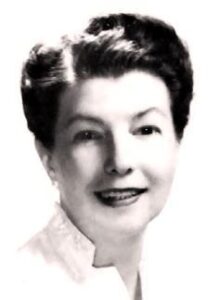by James Scott Bell
@jamesscottbell

Phyllis A. Whitney
Back when I was starting out on this journey, reading book after book on the craft, one of my favorites was Guide to Fiction Writing by Phyllis A. Whitney. It was just what I needed. No fluff and flowers, just practical techniques that work. I review that book every year or so, reading the portions I highlighted.
The other day I did a search for Phyllis Whitney and came across her 2008 obituary:
Novelist Phyllis A. Whitney, whose romantic suspense tales sold millions of copies and earned her top accolades from the Mystery Writers of America, has died. She was 104.
Whitney wrote more than 75 books, including three textbooks, and had about a hundred short stories published since the 1940s.
“I’ve slowed down in that I only write one book a year,” she said in a 1989 interview with The Associated Press, when she was 85. “A writer is what I am.”
Can you relate to that? Can you see yourself at 85, 90, even 100 (Herman Wouk) still writing books? Of course, we are all subject to this mortal coil and the various infirmities, slings and arrows to which it is subject. But if relative health is yours, would you continue to write because “a writer is what I am?”
Whitney’s last novel, “Amethyst Dreams,” was published in 1997. She began working on her autobiography at 102.
In 1988 Whitney was named a Grand Master, the Mystery Writers of America’s highest honor. In 1990, she received the Agatha award, for traditional mystery works typical of Agatha Christie, from Malice Domestic.
Time magazine in 1971 called Whitney one of “the best genre writers” and the only American woman in the romantic suspense field with a major reputation.
In 20th century lit circles the term “genre writer” was a putdown, a close cousin of “hack.” Even if a writer sold millions of books—a la Erle Stanley Gardner and Mickey Spillane—they were not counted as “real authors.” That distinction has largely been erased now, except among those handing out literary awards. Readers don’t think about it at all. What they want is what Whitney gave them:
She said her books were successful because “I tell a good story.”
We all agree that this is our goal. What things did Whitney do to accomplish it in book after book? That’s what Guide to Fiction Writing is about, but she does have a chapter called “The Plus Factor: That Certain Something.” There’s a lot in there, but if I can attempt to sum up it is, in Whitney’s words, a novel that says something worth saying. You find that something in a subject or theme that grabs you, then work it until you are fully, emotionally invested. “If you don’t have this emotional involvement, throw the subject away. You can’t fake conviction.”
One item more from Whitney’s obit:
“I offer optimism,” she said. “All my books have happy endings. I don’t see any point in letting my readers down at the end. I’m an optimist – people feel that in my books.”
Not every author offers an HEA (happily ever after) ending. There is great moral value in tragedy, too. The Greeks knew that. But the point of classic tragedy was to serve as a warning, and an incentive to live a life avoiding the “tragic flaw.” There’s a certain optimism in that, too. You can always offer, as the novelist John Gardner put it, “A vision of life that is worth living.”
With that, I ask you:
What would you want your writer obituary to say?
As you ponder, here are some gems from Whitney’s book:
These days in my writing I try to offer, as a “plus factor,” something unusual in the way of background or profession, and something significant in what my characters must learn in the course of the story—always remembering that reading fiction should be entertaining, and that I must first tell a story.
***
Probably the best way to start any story, long or short, is to show a character with a problem doing something interesting….Long expositions, descriptions, philosophizing, may entertain you, but are unlikely to grip a busy reader today. In the past we could be more leisurely.
***
While you’re writing, you should be satisfied to reread only whatever you wrote the day before. You do this in order to recapture your mood, reacquaint yourself with what happened last, and thus regain impetus to move ahead with the next scene.
***
Climax and Ending are two different things. The Climax is the big dramatic scene in which almost everything is resolved. The Ending is the wrap-up where lovers used to embrace and walk happily into the sunset. If possible, it’s a good idea to leave a thread of question in the reader’s mind right up to the last paragraph. Then let the sun go down fast, give your blessings to the characters and let them go. Let the whole book go. After all, another novel is waiting to be written, and you are eager to get to it!
